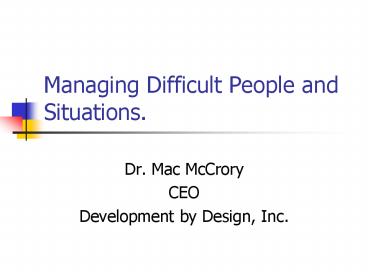Managing Difficult People and Situations. - PowerPoint PPT Presentation
1 / 27
Title:
Managing Difficult People and Situations.
Description:
One character implies that conflict can be a crisis. ... respond in a calm tone of voice - incorporate calming physical gestures ... display receptive body posture ... – PowerPoint PPT presentation
Number of Views:730
Avg rating:3.0/5.0
Title: Managing Difficult People and Situations.
1
Managing Difficult People and Situations.
- Dr. Mac McCrory
- CEO
- Development by Design, Inc.
2
FormerlyWorking with Idiots will Kill you.
3
Idiots Premature DeathStress directly related
to death
- Cardiovascular disease
- Hypertension
- Stroke
- Cancer
- Suicide
- Homicide
- Accidents
4
Conflict
- The Chinese word for conflict is made up of two
characters. - One character implies that conflict can be a
crisis. - The other character indicates that it can be
- an opportunity.
- Conflict itself is NOT the problem.
- Unresolved conflict is the problem.
5
Resolve conflicts issues IFRelationships are
Important
- Family
- Friends
- Co-workers
- Bosses
- Subordinates
- Customers
- Patients, consumers, clients, residents
6
What to expect from dispute/issue management
- Maintain relationships
- Give take
- Manage the issue
- it doesnt go away, deal with it
- Resolve the conflict/dispute
- You dont always get your way
- win some/win some
7
Who are Idiots?Difficult People?
- Are difficult people really just different?
- FROM US?
- Different perceptions of life?
- Different personalities?
- Different styles of communication?
- Different styles of dealing with conflict?
8
Perception, Personality, and Communication
- Perception determines communication
- Personality determines perception
- Interests, positions
- Objective, subjective
- Understanding your personality characteristics
helps you communicate better - Understanding others more effective
communication
9
Assessment Tools
- Myers Briggs
- Insightful Strategies (Colours)
- True Colors (simple, fun)
- Working with Style (work related, calm, storm)
- How to use them
- Tools to help us assess our team function
- Appreciate differences, create unity
10
Personality a picture of yourself, inside and
outside
- Spirit
- Beliefs, values, actions, choices
- Stamina
- Emotional physical well-being
- Situation
- Context of life surroundings
- Skills
- Abilities and competencies developed
- Style
- Characteristic way a person responds/reacts
11
Diverse PersonalitiesWe are all different we
are all alike
- Strengths (utilizing individual strengths to
create team unity and achieve goals) - Joys (how do we measure success, reward)
- Values (whats important to each of us)
- Stresses (what causes it and how do we respond to
it) - Operational codes (the functional aspect of all
of these components)
12
Negotiation, partnering, communication (dealing
w/ people)
- Understanding and appreciating the differences in
the other parties - Demonstrating that appreciation in your
conversation - Getting what you want
- Getting what you need
- Getting to a mutually beneficial state
- Position v interest based negotiation
13
Interests v. Positions
- Interests
- Objective, measurable
- For the good of the order
- Positions
- Subjective, emotional attachment
- For the good of the individual
14
Five Styles of Conflict Management
Compete
Collaborate
Issues
Compromise
Accommodate
Avoid
Relationships
15
Cost Equation
Predictable Conflict
Weak Systems
High Costs
16
Contributions to Weak Systems
- Poor Skills
- Procedures Based on Higher Authority
- No Link to Mission
- Overuse of Litigation to Resolve Disputes
- Alternative Dispute Resolution (ADR) as an
Add-on - Inadequate Prevention
17
High Costs of Conflict
- Litigation Expenses
- Lost Time
- Turnover
- Long-Term Relationships
- Lost Business
18
Binding Arbitration
19
Principles of Interest-Based Negotiations
- Separate people from problems
- Focus on interests, not positions
- Use objective criteria to develop fair
satisfactory options for both sides - Evaluate options according to standards, not
power - BATNA
20
Interest-Based NegotiationsAssumptions
- Communication enhances relationships
- All parties receive benefits
- Each party should help the other
- Open discussion expands interests and options
- Standards replace power
- Anger is defused
21
Benefits of appropriate dispute resolution
- Parties are more satisfied
- Greater range of options
- More creative solutions
- Feel better toward one another
- Relationships preserved
- Parties retain more control
- Interests of all are better served
- Compliance is greater
22
Active Listening
- Commit to sincerely understand/respond to what is
said - Move away from distractions
- Maintain eye contact adjust slightly toward the
person speaking - Acknowledge the speaker by slightly nodding or
smiling - Listen carefully for the main idea being
expressed - Clarify information ask questions at
appropriate intervals - In your own words, restate to the speaker what
you heard - Summarize your understanding back to the speaker.
23
Guidelines
- Empathize with the speaker --- put yourself "in
the other person's shoes" to understand their
thoughts and emotions - I versus U statements
- Demonstrate your understanding and receptivity to
the speaker with appropriate, non-verbal
behaviors - - respond in a calm tone of voice
- - incorporate calming physical gestures
- - use appropriate eye contact
- - display receptive body posture
- Don't interrupt, give advice or try to make
corrections, nor try to inject your own personal
feelings or problems (Yackus Interruptuss)
24
Take Aways
- I versus U statements
- Yackus Interuptus
- Empathize with the other party(ies)
- Speak with empathy and intent
- Heart v. Head Speak
25
Importance of issue and conflict management
- Preserve relationships
- More productive work environment
- Manage or reduce personal stress
- Improve your health and well-being
- Reduce your risk of IRDs
- Idiot Related Diseases
26
Facilitated Team Dialogue
- Coaching for supervisors
- Expressing concerns in an appropriate manner
- Dealing with personal fears in a professional
manner - Dealing with all the different personalities and
issues on a TEAM
27
For more information, contact
- Dr. Mac McCrory
- 405-996-8428
- mac.mccrory_at_cox.net































